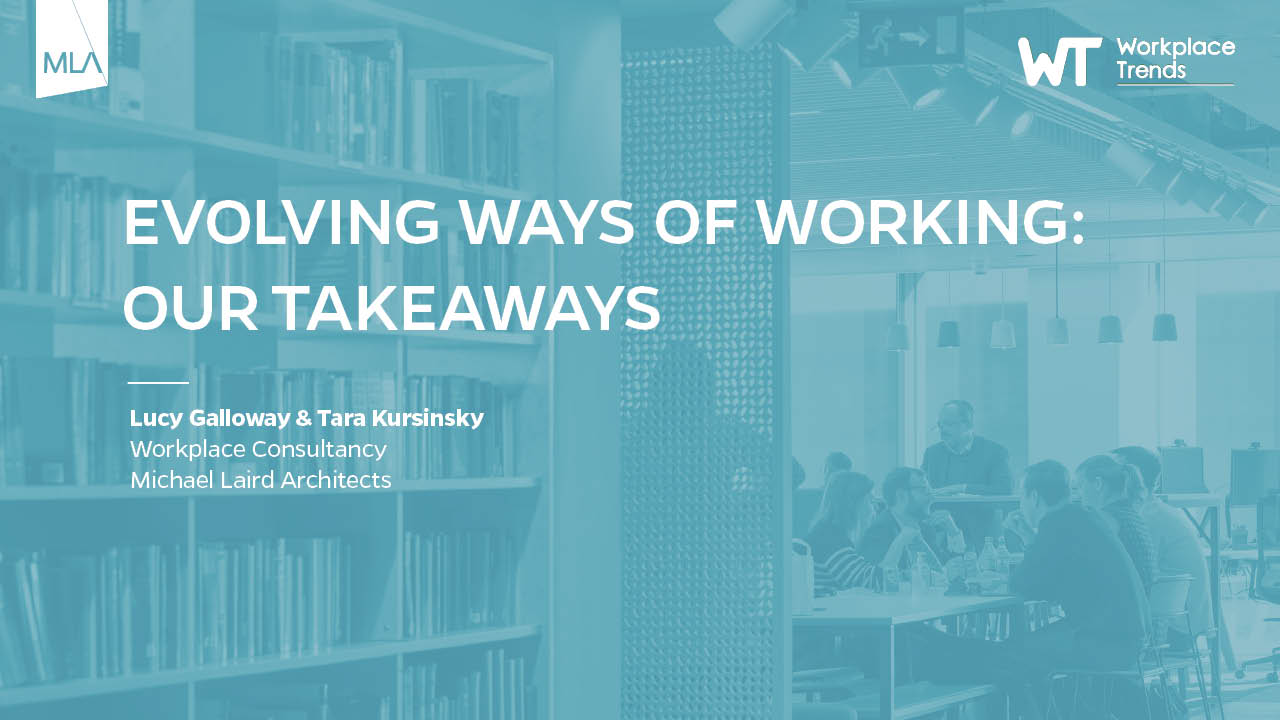Workplace Trends Conference Take-aways
The Workplace Trends Conference last week felt like a significant marker in time for sharing and hearing an unanimous vision to improve our world of work; holistically, for our clients, our colleagues and ourselves. An incredibly well-attended event, both in-person and online presented 10 distinct sessions from industry experts sharing their perspectives and insights on this years theme; The Evolving Ways of Working. MLA were delighted to be included in the line-up. Gillian Stewart shared a selection of Transformational Stories and took part in a panel discussion around how we define and forecast office densities in response to hybrid and smarter ways of working.
It was refreshing to hear a shift in workplace vocabulary from the jaded ‘post pandemic workplace’ and the ‘results of Covid-19’ to a more holistic and positive critique of our relationship with work. Throughout the day we heard of a series of toolkits and project examples we can learn from and don’t believe Covid was mentioned once which was a joy in itself! So, what were the big take-aways and what can we take back to the studio to share and trial with our peers and clients alike? Our workplace consultants Tara & Lucy share their thoughts:
Workspace “Hotelification”
We heard it here first, a welcomed new buzzword to describe the current thinking of making the workplace a fulfilling customer experience. From in-house community managers to enriched lighting, service and quality, design application matters. Thinking about the overall user journey and daily lifecycle allows spaces to adapt, respond and cater for our changing workplace model. Putting people front and centre of spaces, makes us think of a museum display case, where our people are the prime assets.
Quantifying the Qualitative
As a collective of designers and workplace consultants we love sums! Data is imperative to building utilisation, space budgets and site analysis, however the constant reminder throughout the day was the qualitive, emotional connection (or not) is guiding the success of the workplace. It was interesting to hear about Audiem, a software tool to categorise qualitive responses, helping to draw out themes and behaviours from interview transcripts and recordings. How this captures the emotional sense of the room is still up for debate, but we are eager to see how this develops and underlines that the qualitative is equally if not more important than what the data sets reveal.
Less is More
The reality across many organisational, estate footprints is that space is decreasing for sustainable and financial targets. Paul Urmston from NatWest gave an insightful timeline mapping the reduction of sites from 2008 to now whilst providing more choice of environments with fluid territories to optimise employee experience.
Charlotte Lockhart’s presentation, advocating the 4-day working week provided credible, practical reasonings why less time in business is more effective for business. Promoting the modern workplace is a partnership on trust and quality of deliverables which informed the formula of; 100% pay, 80% time = 100% output. Allowing the time ‘in’ work to be entirely productive, not simply busy!
How to do a 4-day work week
- Run a pilot
- Ask people in the organisation how to solve/make it work for the company, ask the staff to define the parameters from a bottom up approach
- Stay Flexible to what it might look like
Reasons it might not work:
- Timing isn’t right (don’t have a good culture)
- Leadership gets too involved
Mindfulness Matters
20-25% of all workforces are, or have suffered from work related stress or anxiety. 17 million working days lost to work related stress annually. 35% of UK employees experience conflict and tension in the workplace. The stats were crystal clear that supporting wellbeing is imperative to a successful workplace, therefore it was hugely apt and rewarding to have a guided meditation half-way throughout the event. Deborah Kempson-Wren’s session revealed we are on autopilot 47% of our lives, inadvertently going about our day. Strength training for the mind (which meditation can be) promoted purposeful presence and increases capacity for intentional practice, a ‘no-brainer’ for productivity!
Thanks to Maggie, the WT team and all the speakers, sponsors, and tech support for a fantastic conference, was great to connect with so many peers and look forward to WT 2023.
